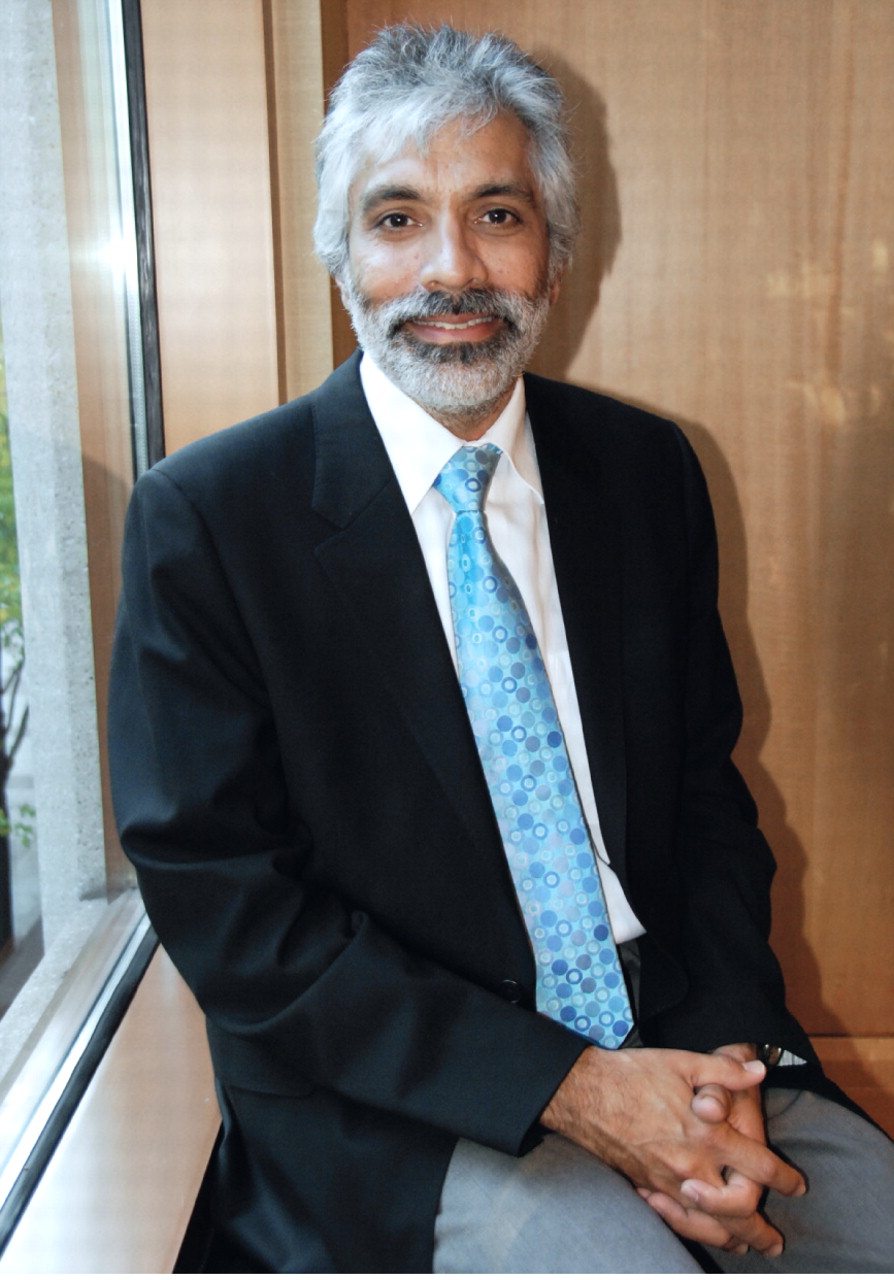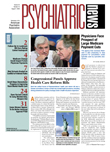Sanjay Gulati, M.D., practices psychiatry in a silent world, a world he resisted, then grew accustomed to, then embraced.
For Gulati, now a child psychiatrist in Cambridge, Mass., the silence arrived on tiptoes: a move to the front row in high school; good grades in small, advanced classes in college and poor ones in large introductory ones; an unexamined preference for the quiet dinner for two rather than the boisterous party.
Finally there was the failed audiogram, the diagnosis of hearing loss, the steady loss of five decibels a year.
“Otosclerosis is not supposed to strike this hard, or this young,” he recalled in a recent interview. The disease is hereditary but, unlike his father's case, was not correctable by surgery. A hearing aid compensated enough to get through undergraduate school at the University of Virginia. In retrospect, he is amazed at how unaware he was of the vast number of adaptations to hearing loss he had made without ever recognizing them as such.
He made a late decision to go to medical school.
“I think it says a lot about how much medicine my parents taught me that I scored the same in the MCAT on physics, my college major, and biology, which I didn't study at all!” he said.
Gulati's father was a surgeon (who later retrained as a neuroradiologist) and his mother an anesthesiologist. Their families left Pakistan for India after the two countries were partitioned in 1947, and the couple eventually settled in Nottingham, England, where Sanjay was born. They sailed to the United States in the 1960s, when Gulati was 9.
“At that point, I was already starting to lose hearing, but I was not yet aware of it,” he recalled. “My piano teacher complained that I wasn't playing pianissimo, even when I was sure that I was.”
His deafness, although progressive, was incremental. He adapted to hearing loss, but still felt cut off from much of the life going on around him. Before passage of the Americans With Disabilities Act, medical schools rarely accommodated the needs of the deaf or others with disabilities, he noted.
“I remember offering to pay for a better microphone during an observation class and being told no,” he said. “As I went through med school and residency, it felt like I just barely slipped through each door as it shut behind me.”
His increasing deafness might have isolated him from the world, but it had the opposite effect. He became more attuned to body language and other visual cues to behavior. Watching sports prompted his own inner game, trying to intuit what move the pitcher or quarterback would make on the next play. Gulati applied the same skill later during shifts in the emergency room to judge if patients were dangerous.
In medical school, he let go of an early interest in surgery—in the OR, everyone talks and everyone wears masks, precluding lip reading. Other logical choices for a doctor losing his hearing, such as pathology and radiology, seemed socially isolating. That led Gulati to his specialty.
“Psychiatry offered a chance to explore the subjective world, a nice mirror image to my college interest in deeply understanding the objective one,” he said.
Gulati graduated from Eastern Virginia Medical School in Norfolk in 1988, completed his internship there a year later, did his residency in psychiatry at Albany Medical College, and then held a child psychiatry fellowship at Cambridge Hospital. Today, he is an instructor in psychiatry at Harvard Medical School, works at the Cambridge Health Alliance and Children's Hospital Boston, and is a consultant to the American School for the Deaf in West Hartford, Conn. He has co-edited, with Neil Glickman, Ph.D., a textbook, Mental Health Care for Deaf People: A Culturally Affirmative Approach (Laurence Erlbaum Associates, 2003).
Gulati did not seek out deaf patients in residency, but had his epiphany during his child psychiatry fellowship at Cambridge Hospital, recalled Terrell Clark, Ph.D., director of the Deaf and Hard of Hearing Program in the Department of Otolaryngology at Children's Hospital Boston, under whom he trained.
“He accompanied a child to the hospital and saw for the first time the specialty clinic here,” said Clark in an interview. “He was still coping with his own hearing loss but had not yet identified with being deaf. I know of other deaf physicians and other psychiatrists with signing skills but not of another deaf psychiatrist. He's been an inspiration for others.”
He was not fluent in sign language when he began, but he soon became comfortable, she said. Learning to practice medicine in another language was difficult.
“For patients, baring your soul through a third party creates an artificial barrier,” she said. “You're not sure if what you said and how you said it came across. So having a therapist with whom you can communicate is important.”
Gulati's personal and professional experience gives him an edge when helping patients and families understand complex information they may not want to hear, said Lauren Esposito, Ph.D., director of the Deaf and Hard of Hearing Service in the Department of Psychiatry at Cambridge Hospital, and one of Gulati's former trainees.
“He is good at working in a system that is not used to working with the deaf,” said Esposito in an interview. “The treatment process can be anxiety-provoking for both patient and staff, especially if the staff doesn't know about deafness.”
When appropriate, he will share his own experience with his patients and their parents, which can inspire and validate patients, she said.
Issues shared by all psychiatrists take on an added dimension for a psychiatrist who is deaf. Take the matter of transference.
“I have to deal with transference related to my lucky status as a late-deafened person who was able to squeak through medical school at a time when other deaf people could not,” he said.“ Countertransferentially, I often have to deal with feelings of guilt around the same issue. I know a young man, for example, who cleans hotel rooms. It's clear to me that had he had appropriate language exposure and educational opportunity, he could have gone to college and graduate school as I did. I think one has to try to turn this anger into appropriately aimed activism. As a practicing psychiatrist, I keep my activism fairly quiet, but my current project is to seek wider recognition of the syndrome of language deprivation.”
Gulati has spoken out about the central role of language itself in the development of young people who are deaf. He believes that early training for those children in American Sign Language prepares neural pathways in the brain for general language development and for later acquisition of English.
However, sign language doesn't always lend itself well to diagnostic language. There are currently four or five different signs in use now for autism, for example. So Gulati is working with others to agree on conventional technical terms in American Sign Language.
Beyond the science, though, Gulati appreciates the fluidity and expressiveness of signing.
He also appreciates the insights of deaf humor in sign language, often used to get through life's hardships, as it is for other minority groups.
Deaf humor is hard to describe, he said, but often it involves acute awareness of the divide between the deaf and hearing worlds, sometimes with a touch of aggression toward the dominant (or oppressive) culture. Usually, there's some artistic or creative signing involved.
He remembers one deaf woman, signing with her right hand, who momentarily forgets a word: “She slaps her right hand with her left, as if it were a malfunctioning television set.”
Eventually, the experience that shaped his own life would help shape that of his patients. What others might see as a handicap and a constriction, Gulati came to embrace as an opening door into a wider world.
“Had I not lost my hearing, I'd probably have become a competent, somewhat disconnected physicist,” he concluded. “I have instead become a deeply involved and thoroughly fulfilled physician. It is difficult, in looking back over the journey so far, to see my hearing loss solely as loss or affliction. It has brought more into my life than it has taken away.”▪

